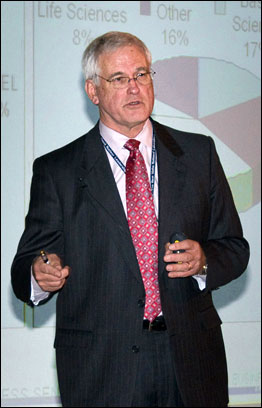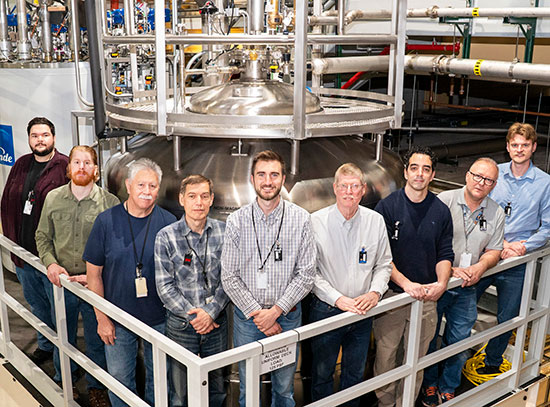Battelle President, CEO Carl Kohrt Addresses Lab Community
March 7, 2008

Carl Kohrt
"Congratulations on the many achievements you have made both individually and organizationally for over 60 years," said Battelle President and CEO Carl Kohrt to a large gathering of BNL employees in Berkner Hall on February 28. Lab Director Sam Aronson explained in his opening remarks that Brookhaven Science Associates (BSA), the company that manages BNL, consists of a partnership between Battelle and Stony Brook University, each institution providing a Chair of the BSA Board of Directors for two years on a rotating basis. Kohrt, Chair of the BSA Board of Directors for the next two years, was at the Lab for a BSA Board meeting and was taking the opportunity to address the Lab.
Kohrt introduced co-Board members from Battelle who were in the audience: Jeffrey Wads-worth, Jeffrey Smith, also of Oak Ridge National Laboratory (ORNL); and Martin Inglis. He also complimented BNL on the appreciation recently expressed to him by Under Secretary for Science Ray Orbach on BNL's progress in 2007. Kohrt explained that his purpose in speaking to the Lab community was to provide "a little education about Battelle and where we see our future in Battelle, and BNL's role in that future, which we see as very rich for both of us."
As Kohrt outlined, Battelle is a nonprofit research and development (R&D) organization with $1 billion of its own assets, about $4 billion in annual revenue, and about 20,000 employees worldwide, a number that has doubled in the past six years. As stated by its founder in 1923, Battelle has a specific mission: to be devoted to scientific discovery, to applying that discovery to industry to allow industry to become more competitive, and to using a minimum of 20 percent of net profits to benefit the community by charitable works and education - education being of particular interest - and to re-investing the remainder to advance new scientific discoveries.
"Today, Battelle has a branded approach of simultaneous excellence recognized internationally," continued Kohrt. "Excellence in science and technology, excellence in lab operations, and excellence in community service." He emphasized that lab operations include providing facilities so that good and affordable science can be done, and that environment, safety, health and quality considerations in all operations are equally important.
"Issues around safety are absolutely critical at Battelle, as at every one of our facilities," he stated, remarking that Brookhaven's latest safety performance has somewhat improved. "We will do everything we can [to help], but it's got to be done locally," he said.
Kohrt listed many of the scientific laboratories and ventures managed or cooperatively managed by Battelle, which include Pacific Northwest National Laboratory, BNL, ORNL, National Renewable Energy Laboratory, and Idaho National Laboratory, as well as many others. He explained that, in its business model, Battelle seeks a balance between the different branches of operations: scientific research, technology transfer to industry, and commercialization, and between the different risks associated with various sources of funding. The future could hold, for example, more non-governmental sources of income, sources outside DOE, limited-run manufacturing, international locations, etc.
"In less than ten years, we hope that three-quarters of our revenue will be associated with labs and research. Scientific laboratory operations are really core to Battelle," Kohrt said. The broad base of science and technology capabilities from Battelle's involvement in nine major labs will be vital in matching U.S. needs in energy, national security, and health and life sciences, he indicated.
As to what Battelle and BNL can do together, one example Kohrt mentioned is a recently signed multi-lab contract in energy that will get some revenue back to the labs. Another such contract, that includes BNL, is being considered in the arena of national security.
"Battelle wants to be the convener for multi-lab contracts," he said. Other possibilities of collaboration can be explored, he said. Regarding energy discoveries, BNL's advantages include research done at the Center for Functional Nanomaterials, computation on New York Blue, and research done at the National Synchrotron Light Source (NSLS) and the future NSLS-II, Kohrt said. BNL also has promising work ongoing in the life sciences that could match with Battelle's focus in biology and medicine, in defense, on detection and protection, and in applied science.
Kohrt explained that Battelle's strategic thinking is global, seeing its labs collectively as resources for global business in basic science, energy science and technology, national security, and health and life sciences. "Our goal is to focus our earnings growth on those four global businesses," he said.
In response to a question on the renewal of the BSA contract, which has two one-year periods remaining to run, "We'll do whatever we must do to continue," Kohrt said. "We really want it." Answering another question as to whether Battelle is fulfilling DOE's requirements, he replied that Battelle has had increasing access to DOE leadership and that efforts to provide information to help with energy policy have been well received. But we all face challenges when administrations change, he noted. "We're subject to the same challenges that you are.
"I thank you all for what you do," Kohrt concluded. "We're going to do everything we can to find ways to allow you to keep doing it."
Note: Video of Carl Kohrt's talk is available on the web through WBNL streaming media.
2008-578 | INT/EXT | Newsroom









